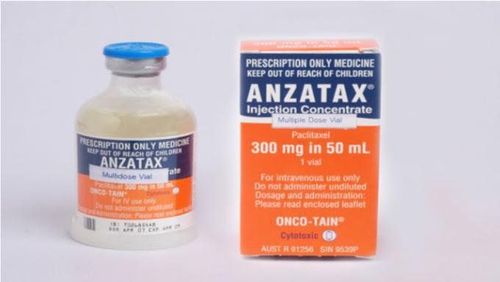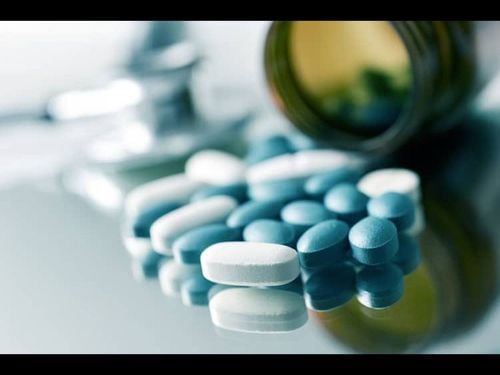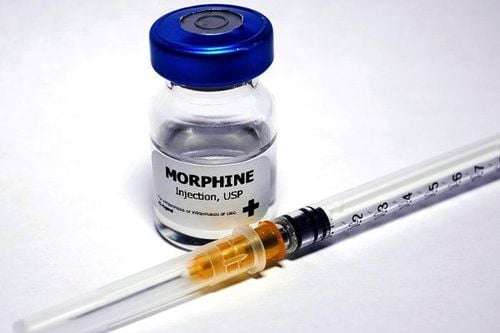This is an automatically translated article.
Chemotherapy is one of the treatments for colon cancer used in patients prescribed by a doctor. The development of medicine has produced many chemical drugs that have therapeutic effects. However, colon cancer patients during and after chemotherapy may experience some unwanted effects.
1. Chemotherapy for colon cancer
Chemotherapy is a method of using one or more chemotherapy drugs to destroy cancer cells in the patient's body. Chemotherapy is an important systemic treatment method in the treatment of colon cancer besides surgery, vascular antibiotic therapy, and immunotherapy.Colon cancer chemotherapy drugs work by attacking malignant cells that are dividing, but they can also attack normal cells that divide like cells in the lining of the lining of the colon. mouth, intestines, or in hair follicles,... cause side effects. This sets out for researchers to find new chemotherapy drugs that have powerful cancer treatment effects but limit unwanted toxicity.
Chemotherapy can be carried out before or after surgery for colon cancer to completely treat the disease or chemotherapy in patients too indicated for surgery to help treat symptoms, reduce disease, and improve quality of life. and prolong survival for colon cancer patients. Indications for chemotherapy are set at each stage of the disease for different purposes, can use chemotherapy alone but often combine chemotherapy with other methods:
Adjuvant chemotherapy: Chemotherapy Adjuvant is the use of chemotherapy drugs for post-surgery treatment. Colon cancer patients who have undergone surgery will first be evaluated postoperatively, patient's condition, pathology and stage of the disease after surgery, ... from which to consider the indications for adjuvant chemotherapy after surgery. or not. Adjuvant chemotherapy is aimed at killing potentially residual cancer cells after colon cancer surgery, in order to reduce the risk of disease recurrence. Neo-adjuvant chemotherapy: Chemotherapy is given to colon cancer patients with large inoperable tumors. Neo-adjuvant chemotherapy aims to reduce tumor size, support future colon surgery to be convenient and achieve effective treatment. Symptomatic chemotherapy (also known as palliative chemotherapy): Patients with late stage cancer who are too indicated for surgery, no longer able to undergo radical treatment will be considered symptomatic chemotherapy regimens to shrink the tumor. tumor, supporting symptom relief and prolonging survival time.
2. Indications for colon cancer chemotherapy
The appointment of chemotherapy for colon cancer depends on many factors:
Pathological characteristics and stage of colon cancer: Depends on pathological features (pathology, immunohistochemistry) , gene mutations,...) as well as the stage of the disease in which the patient will be given treatment plans with different treatment goals. Specifying the type of chemical with the appropriate route and dose in each disease form, the stage of the disease is related to the success of treatment as well as limiting unwanted effects for the patient. General condition of the patient: Age, physical strength, comorbidities,... are factors to be considered when using chemotherapy for a patient in order to both achieve treatment goals and avoid toxicity. to other organs in the patient's body. Level of response to previous chemotherapy: Patients who have had chemotherapy with one or more previous chemotherapy drugs will be evaluated for treatment response, thereby considering dose adjustment or change of chemotherapy regimen. other substances to achieve therapeutic effect. Patient's wishes for treatment: The patient's cooperation and consent are subject to professional regulations. After the doctor explains the treatment, understands the benefits and risks of chemotherapy, the patient will make treatment decisions and coordinate with the medical staff to detect abnormal signs. , unwanted side effects during chemotherapy and timely treatment.
3. Groups of chemotherapy drugs for colon cancer treatment
Cancer chemotherapy drugs can be used alone (monotherapy) or a combination of chemotherapy drugs (polychemotherapy). Chemicals are used in many different ways such as intravenous, oral, ... with appropriate doses to treat the disease.
Chemicals commonly used in colon cancer are:
Fluoropyrimidine and its derivatives: Fluoropyrimidine was the first recognized effective chemical in the treatment of colon cancer. The drug is taken into the body as a precursor, then metabolized to form an active form that inhibits the activity of the synthetic enzyme in the cell, binds to the enzyme thymidylate synthase and prevents the synthesis of thymidine, thereby inhibiting synthesis of nucleic acids (DNA, RNA). Common fluoropyrimidine chemicals on the market are 5-Fluorouracil (intravenous), Capecitabine (oral),... Calcium folinate: Calcium folinate is the calcium salt of folinic acid, the active form of folic acid. Calcium folinate significantly enhances the effects of 5-Fluorouracil (5-FU) in combination with this chemical, inhibiting cancer cell division by prolonging the activity of the enzyme thymidylate synthase and hindering the growth of cancer cells. synthesis of nucleic acids (DNA and RNA). Oxaliplatin: Oxaliplatin is a third generation platinum derivative. Oxaliplatin works by binding to DNA and inhibiting DNA synthesis, leading to cell death. Oxaliplatin increases synergism when combined with 5-Fluorouracil. Irinotecan: Irinotecan is a semi-synthetic derivative that causes cytotoxicity through the inactivation of Topoisomerase I, thereby causing single-stranded DNA damage.
4. Side effects of colon cancer chemotherapy
A question many patients wonder is whether chemotherapy for colon cancer has any effect? As mentioned above, chemotherapy drugs in addition to killing cancer cells can also affect other normal cells, which is why chemotherapy patients may experience some side effects. side effects during and after treatment. The side effects of chemotherapy for colon cancer depend on the type of chemotherapy, the dose used, as well as the location and physical condition of the patient. Common undesirable effects in colon cancer chemotherapy include:
Nausea, fatigue, loss of appetite: Nausea, vomiting, fatigue, anorexia are common side effects of treatment. with chemicals in general and chemotherapy for colon cancer in particular. This side effect is usually not too serious and will subside as the active ingredient of the drug is eliminated. Doctors usually prescribe prophylactic antiemetics for patients before and after each chemotherapy session. When there are signs of nausea, vomiting, patients need to drink enough water, divide meals during the day to ensure water, electrolytes and nutrients for the body. Peripheral neurotoxicity: Patients undergoing chemotherapy with Oxaliplatin (in regimens CAPOX, FOLFOX, ...) often experience undesirable effects on peripheral nerves with manifestations of numbness of lips/tongue/teeth, stiffness. jaw, paresthesia, throat obstruction. Peripheral neurotoxicity may occur during the first course of Oxaliplatin treatment or after multiple courses of chemotherapy. Patients should limit drinking cold water after chemotherapy with Oxaliplatin to avoid this unwanted effect. If there are signs of peripheral neurotoxicity, the patient should immediately notify the doctor for timely treatment. If symptoms are severe, your doctor will consider reducing your dose or delaying chemotherapy with Oxaliplatin. Hand, foot syndrome: Hand-foot syndrome is one of the side effects of colon cancer chemotherapy that can be seen in patients treated with Capecitabine chemotherapy. Common manifestations in long-term Capecitabine users are darkening, dry skin of the palms / feet, which can lead to skin peeling, nail / toenail damage. This symptom can be relieved with some supportive measures such as: applying emollient cream, avoiding sun exposure, wearing tight socks, tight shoes,... Diarrhea: Diarrhea may occur during chemotherapy treatment. , especially Irinotecan, makes patients tired, dehydrated and possibly exhausted due to disturbances in water-electrolyte balance. It is necessary to monitor the number of diarrhea episodes per day and the severity of the patient's diarrhea. Pay attention to distinguish diarrhea caused by chemicals or other causes such as gastroenteritis, ... If other causes of diarrhea can be ruled out, the doctor may consider taking medication to treat symptoms of diarrhea. flow like Imodium depending on the severity of the patient's diarrhea and water-electrolyte disturbances. Hair loss: In addition to the side effect of severe diarrhea, Irinotecan also causes hair loss, which can affect the psychology of the patient. Therefore, doctors need to consult carefully before chemotherapy so that patients can prepare psychologically when encountering this side effect. Leukopenia, thrombocytopenia after chemotherapy: As with other chemotherapy drugs, colon cancer chemotherapy can also affect the body's hematopoietic system with leukopenia and/or decreased white blood cells. platelets after chemotherapy. Patients with neutropenia after colon cancer chemotherapy with regimens such as FOLFOX, CAPOX rarely show symptoms, but may also have fever or risk of infection. Patients undergoing chemotherapy for colon cancer are also at increased risk of thrombocytopenia after chemotherapy. Thrombocytopenia may be asymptomatic or present with signs of subcutaneous hemorrhage (purpura, ecchymosis, etc.); mucosal bleeding such as nosebleeds, bleeding gums or bleeding in the gastrointestinal tract, urinary tract, ... That's why doctors often closely monitor patients and order blood tests to control check after chemotherapy, for timely treatment. In summary, chemotherapy can be given before or after surgery for colon cancer to completely cure the disease or chemotherapy in patients who are too indicated for surgery. Colon cancer chemotherapy drugs work by attacking dividing malignant cells, but they can also attack normal cells and cause side effects. This sets out for researchers to find new chemotherapy drugs that have powerful cancer treatment effects but limit unwanted toxicity.
Please dial HOTLINE for more information or register for an appointment HERE. Download MyVinmec app to make appointments faster and to manage your bookings easily.













